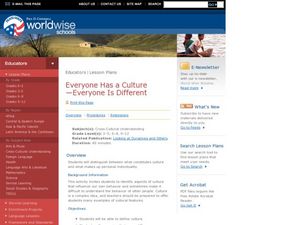Museum of Disability
Don't Call Me Special
Introduce young learners to the idea of disabilities and making friends with children who are different than they are. Using Don't Call Me Special - A First Look at Disability by Pat Thomas, learners are guided through the new...
Museum of Disability
Stand Tall, Molly Lou Melon
Help to create the next generation of friends with a lesson about accepting people who are different. As kids read Stand Tall, Molly Lou Melon, they answer a series of discussion questions and activities about making friends...
Museum of Disability
Don't Laugh at Me
You can prevent bullying in your classroom by addressing kindness, empathy, and acceptance with your littlest learners early on. After reading Don't Laugh at Me by Steve Seskin and Allen Shamblin, kids discuss the ways that words...
WITS Program
Whoever You Are
Deep down, everyone is the same. Discuss the similarities and differences between people across cultures with a series of reading activities based on the beautiful story and illustrations in Whoever You Are by Mem Fox.
Curated OER
How Are We Different?
Students discuss the differences between boys and girls. In this acceptance lesson, students view pictures of boys and girls and use a Venn Diagram to chart their differences. Students discuss boy activities and girl...
abcteach
Flowers for Algernon, by Daniel Keyes
Looking for materials to accompany your study of Flowers for Algernon, by Daniel Keyes? Look no further! Included here is everything you need to go alongside your unit: worksheets, graphic organizers, writing assignments, an assessment,...
Museum of Disability
Can You Hear a Rainbow?
Teach your class about compassion and empathy with Jamee Riggio Heelan's Can You Hear a Rainbow? As kids read about Chris, a boy who is deaf, they discuss the things he likes to do, as well as the ways he communicates with the world.
Curated OER
Ages in Stages: An Exploration of the Life Cycle based on Erik Erikson's Eight Stages of Human Development
Examine Erikson's chart on the various stages one goes through growing up. Individually, they write a paper on whether or not they fit into those categories and how they are different today. In groups, for each stage they role play the...
Curated OER
Credible Sources on the Internet: What to Trust, What to Dismiss and When to Cite a Source
Wait, you mean researchers don't all use Wikipedia? Teach your class about intelligent research with a lesson about evaluating digital sources. The lesson starts with a quickwrite and includes vocabulary exercises and several...
Curated OER
Physical Differences
Students role play what it would be like to have a physical disability. In this lesson on acceptance, students listen to the book A Rainbow of Friends by P.K. Hallinan. As a class, the students discuss similarities and differences in...
Museum of Disability
Rolling Along
Kindness and empathy can be as important as reading comprehension skills, especially for younger learners. Reinforce both with a lesson based on Rolling Along: The Story of Taylor and His Wheelchair by Jamee Riggio Heelan. As...
Museum of Disability
Taking Visual Impairment to School
What is the world like when you can't see, or when your vision is impaired? Learn about how Lisa communicates with the world around her with Taking Visual Impairment to School by Rita Whitman Steingold. Learners answer...
San José State University
Commonly Misused Words
After reviewing two pages of commonly misused words: effect/affect, accept/except, there/their/they're, etc., learners must choose the proper word in ten different sentences. Note: Answers are listed at the bottom of page three.
Penguin Books
Wonder in the Classroom
Would you rather be right, or would you rather be kind? A novel unit based on R.J. Palacio's Wonder focuses on the need to be kind to others and to accept their differences. As learners read the book, they discuss the themes of...
Curated OER
Everyone has a Culture-Everyone is Different
Students explore cultural features. In this multicultural acceptance lesson, students define and discuss "culture," and distinguish the difference between individual characteristics and cultural characteristics. Students...
Curated OER
"Little" Brothers Share Big Bond
Students listen to the story Little Brothers Share Big Bond and answer comprehension questions. In this lesson on acceptance, students use various areas of reading (vocabulary, fluency, comprehension) to promote compassion and an...
Museum of Disability
Looking Out for Sarah
Perry the dog is Sarah's best friend and her guide to the visual world. Young readers learn about guide dogs and communication with Looking Out for Sarah by Glenna Lang, through a series of discussion questions and activities.
Field Museum
The Case of Darwin's Finches
One of the most striking pieces of evidence for Darwin's Evolution of Species was his observations of finches and how their beaks differed from island to island, depending on their primary food sources. So what would happen to the theory...
Curated OER
Accept/Except
In this confusing words worksheet, students review the meanings of the words accept and except. Students then read examples of using the words correctly.
Curated OER
Arthur's Nose
Students read a story and complete a story map. In this diversity and acceptance lesson, students read Arthur's Nose, make a story map, research Aardvarks, complete a Venn Diagram comparing Arthur's nose to other animals in the...
Curated OER
An Analysis of Jim Crow Laws and their Effects on Race Relations
First graders analyze the role of the Jim Crow laws on race relations. As a class, they are segregated based on the color shirt they have or some other simple criteria and wear either a square or circle sticker representing the majority...
Saylor Academy
Persuasive Techniques
Want to safeguard your students against peer pressure? Teach them all about rhetorical appeals, common attack methods, and various argument tones with a reference sheet on persuasive techniques.
Film English
Stand Up
To stand up can have many different meanings. Examine the different usages in English and relate one of these meanings to a short film about homophobic bullying. Class members view and discuss the film as well as a short reading passage...
Chandler Unified School District
Satire: The Art of Indirect Persuasion
A free press is entitled to its opinions. While the news pages report the facts of events, editorial pages feature writers' and cartoonists' opinions about events to either directly or indirectly persuade. Introduce viewers to the art of...

























